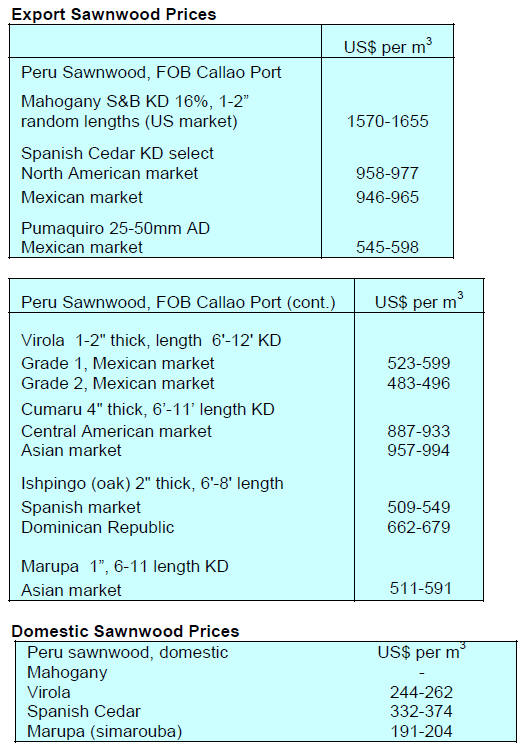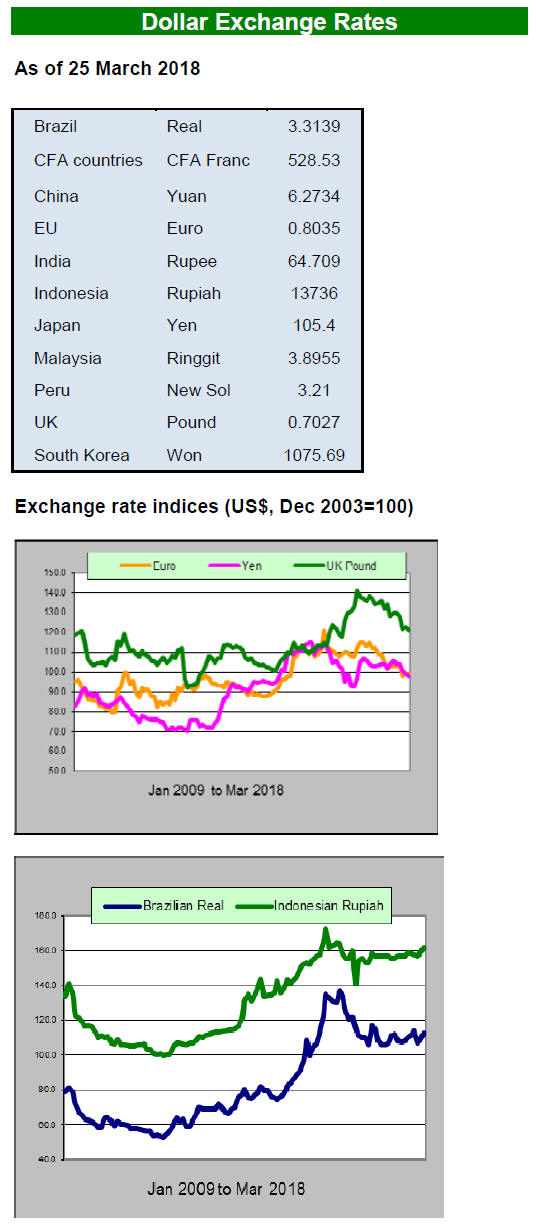2. GHANA
Approved contracts rose in Q4 2017
The Forestry Commission’s Timber Industry Development
Division (TIDD) has reported export contracts for a
volume of 164,759 cu.m were processed and approved
during the fourth of 2017.
This volume is close to 60% higher than in the final
quarter of 2016.
Table below shows the comparative breakdown of
approved export contracts for the 3rd and 4th quarters of
2017.
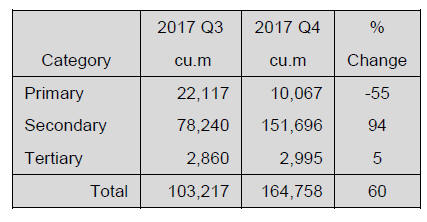
Export volumes of primary products (mainly
billets/logs)
fell 55% in the final quarter of 2017 compared to third
quarter. This decline was as a result of fewer shipments of
plantation teak logs/billets.
For the period under consideration the volume of
secondary products almost doubled compared to the
performance in the third quarter to a volume of 151,697
cu.m. Tertiary product exports also increased from 2,860
cu.m in the third quarter 2017 to 2,995 cu.m in the fourth.
The TIDD report said contracts for overland plywood
export rose 49% rise in volume. Shipments to
neighbouring West African countries. Sawnwood
accounted for 86% of overland shipments.In the final
quarter of 2017 exports of sawn rosewood increased by
160% to 86,300 cu.m.
Main markets unchanged
The West African market continued to be the lead market
for Ghana’s plywood. Of the total 2,850 cu.m exported,
2,293 cu.m was for the West African sub regional markets
notably Nigeria.
India continued to be the main destination for teak
(sawnwood and logs/billets) as well as gmelina logs while
the Middle East and Egyptian markets emerged as a major
destinations for backing grade veneer.
The markets for tertiary products such as sliced veneer and
kiln dried sawnwood were European member states while
air dried rosewod and other high density species such as
apa, ekki and denya found their way to the Chinese
market. China also emerged as a major destination for
sawn and kiln dried wawa.
Ghana firms up structures to weed out forest sector
illegalities
As part of government measures to control illegal
activities in the forest the Forestry Commission (FC)
organised a workshop to assist domestic timber companies
understand regulations for the forestry supply chain.
In a press statement, the FC said government is committed
to the implementation of a number of interventions to
address issues of deforestation, forest degradation and the
improvement of the contribution of forests to the country’s
economy.
The battle against illegal activities in the forestry sector
continues and the FC is doing every it can eliminate such
activities. But much more is needed, especially building
capacity of sector stakeholders.
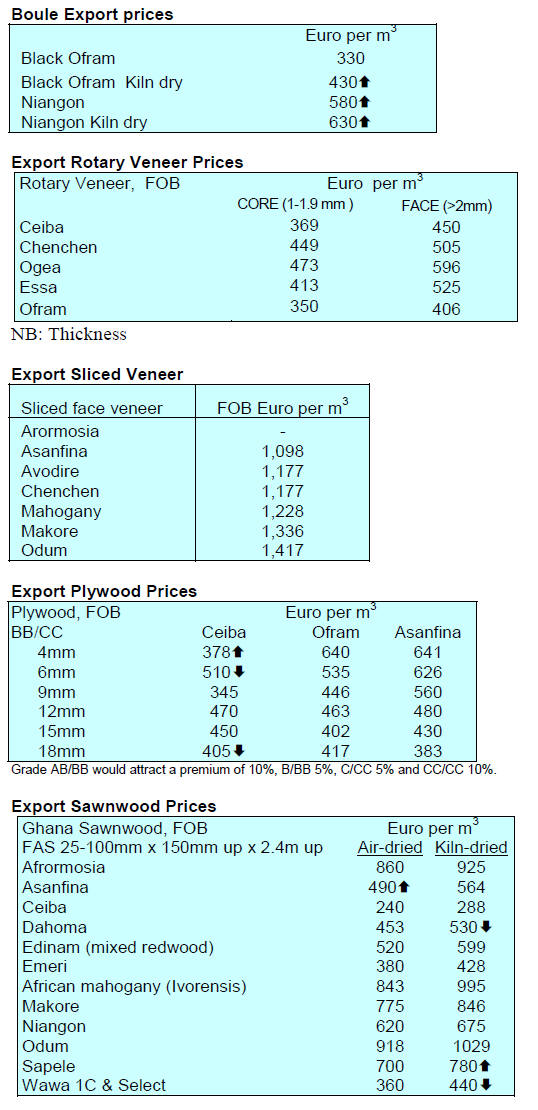
3.
MALAYSIA
Researchers to benefit financially from
discoveries
A structure is being created that will allow researchers at
the Forest Research Institute Malaysia (FRIM) to benefit
financially from their discoveries. This was announced by
the Natural Resources and Environment Minister, Dr Wan
Junaidi Tuanku Jafafar.
The minister said the aim of the scheme is to provide
incentives to researchers working on practical issues. At
present only FRIM and the Government were entitled to
royalties from discoveries.
Raising awareness of importance of forest
conservation in Sabah
An Environmental Conservation initiative was recently
started in the Garinono Forest Reserve aimed at restoring
the diversity of the forest structure and at the same time
raising public awareness on the importance of forest
conservation. The event was jointly organised by the
Sabah Forestry Department and the Sandakan Polytechnic.
To launch the initiative some 400 tree seedlings, mainly
kapur merah (Borneo camphor) were planted. Forty–two
students were instructed on tree planting techniques.
Legality certification training for companies in
Sarawak
The state administration has targeted 2020 by which time
wood products from the state will all be certified under the
Sarawak Timber License Verification System (STLVS).
The state Forest Department is now preparing guidelines
and training for timber companies.
The Acting Director of the Forestry Department, Hamden
Mohammad, said companies would be given two years to
ready themselves for implementation. He stressed the
STLVS will project a positive image for the timber
industry as the auditing of the system would be undertaken
by a third party.
The STLVS was developed through consultation with
representatives of government and the timber industry.
To-date 16 timber companies have adopted the STLVS
since its introduction last year.
4.
INDONESIA
Plans to protect unique
Indonesian craft designs
Haris Munandar, Secretary General in the Ministry of
Industry, has said Indonesia’s furniture industry is a
priority industry but that Indonesian furniture exports are
far below those of countries like Vietnam, Malaysia and
Singapore.
The minister reiterated that the furniture sector is
important for its capacity to absorb high levels of unskilled
and semi-skilled labour. In related news, the minister
spoke on efforts to protect the creative capacity of
Indonesian craftsmen and women.
The Ministry of Industry will facilitate Intellectual
Property Right (HAKI) registration for such the crafts
persons. Efforts are also underway to boost exports
through more effective promotion of the unique national
furniture and handicraft products.
The ministry has launched an e-Smart on-line programme
in cooperation with some domestic manufacturers.
Ministry of Industry rejects log export plan
In a surprise move, the Ministry of Industry has said it
rejects the plan to allow plantation log exports. The
Director of Forest Products and Plantation Industries in the
Ministry of Industry said that the focus of national
industrial development is to add value to natural resources.
See: http://industri.bisnis.com/read/20180312/257/748688/
kemenperin-tegaskan-tolak-wacana-ekspor-bahan-mentah
First e-commerce sale to the US
For the first time processed wood products offered through
the e-commerce scheme have been shipped to the United
States. Recently a shipment of processed merbau from CV
Indo Jati Utama, in Semarang, Central Java, was shipped.
The overseas order was through the online marketing
system launched by the Association of Indonesian Forest
Concessionaires (APHI). The system is called Indonesian
Timber Exchange E-Commerce. Director of CV Indo Jati
Utama, Gunawan Budikentjana, said the US market is
very demanding but selling SVLK certified wood products
on-line has great promise.
In related news, a spokesperson in the Ministry of
Environment and Forestry said the ministry expects the
use of online marketing of SVLK certified timber will
boost exports.
Correction
We wrong reported Ida Bagus Putera Parthama as APHI
Executive Director, when it is Indroyono Susilo. Our apologies
to both.
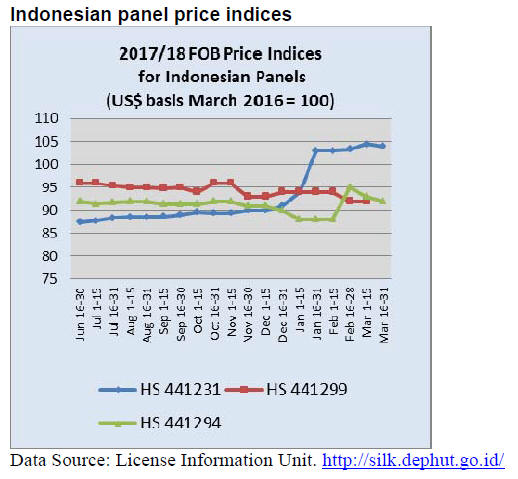
5.
MYANMAR
Foreign investment in-flow target achieved
Aung Naing Oo, Director General at the Directorate of
Investment and Company Administration (DICA) and
secretary of the Myanmar Investment Commission (MIC)
said Myanmar’s foreign investment inflows will exceed
the targeted for the 2017-18 financial year that ends 31
March, 2018.
For the year, the MIC has granted investment approvals
valued around US$ 6.11, which includes the value of
expansion and investment in the Thilawa Special
Economic Zone (SEZ). The total investment injected into
the Thilawa SEZ in the 2017-18 financial year is around
US$400 million.
Manufacturing, real estate and the services sectors are the
top three investment areas while mining, livestock and
fisheries saw limited inflow.
In the current fiscal year the oil and gas sector as well as
construction saw zero investment said Aung Naing Oo.
Myanmar enacted a new Myanmar Investment Law last
year to attract investment, stimulate the job market and
improve the Myanmar economy.
Doing business super challenging say new report
Recently the Yangon-based Myanmar Centre for
Responsible Business (MCRB) - an initiative funded by
the UK, Denmark, Norway, Switzerland, the Netherlands
and Ireland- announced its latest "Pwint Thit Sa"
("Blossoming") study which says a lack of transparency
and ’murky’ financial dealings continue to make doing
business in Myanmar "super challenging".
The study, the most ambitious of its kind, ranks
Myanmar’s public, private and listed companies on a
range of criteria covering everything from auditing
practices and ethics to whether the company has a website.
There are some companies that have attained standards
common to the region says the report but there is much
more to do according to the co-author and director of the
Myanmar Centre for Responsible Business, Vicky
Bowman.
See: http://www.myanmar-responsiblebusiness.org/index.php
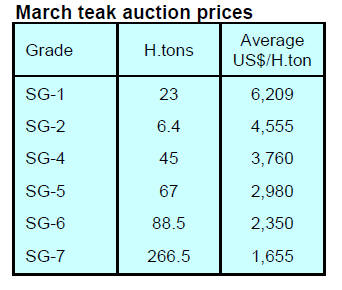
6. INDIA
Unexpected drop in panel price index
India’s official wholesale price index for all commodities
(Base: 2011-12=100) for February 2018 released by the
Office of the Economic Adviser to the government (OEA)
remained unchanged from January at 115.8.
The annual rate of inflation, based on monthly WPI in
February 2018 was 2.48% up on February 2017 and was
also higher than in January. The overall index for the
wood products and cork group rose by 0.1% to 130.9 due
to the higher prices for wooden splint (+2%), veneer
sheets and wooden boxes/crates (1% each). However, the
index for plywood, blockboard and other woodbased
panels declined.
The press release from the Ministry of Commerce and Industry
can be found at: http://eaindustry.nic.in/cmonthly.pdf
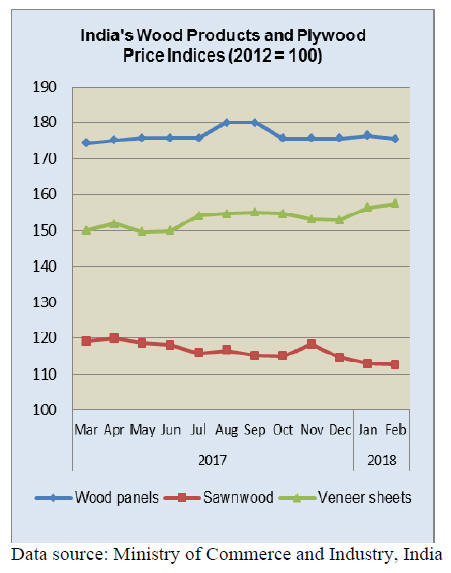
Negative impact of GST and demonetisation
eases
India’s industrial output expanded faster than expected to
7.5% in January from 7.1% in December and inflation
figures showed a modest decline laying the foundation for
further growth. Analysts are interpreting the latest data as
suggesting the negative impact of de-monetisation and
initial turmoil from introduction of the standard Goods and
Services Tax has waned. The economy is forecast to grow
6.6% in the current financial year.
Double digit rise in Maharashtra’s forest cover
At an International Day of Forests 2018 event it was
announced that over the past 20 years the forest cover in
Maharashtra State increased by 6,839 sq. km or around
16%. In addition the area of mangrove forest had almost
doubled from 155 sq. km in 1995 to 304 sq. km in 2017.
Two main reasons were given for the success in
expanding
the forest cover, improved conservation efforts at the
district level and the active participation of local people in
forest management.
Small companies exiting real estate sector
The Indian housing market is undergoing significant
change in that there is an ongoing consolidation of house
builders in the so-called ‘unorganised’ sector which, until
recently, accounted for most almost 90% of house building
in the country.
These small and medium sized companies are struggling
to cope with stringent regulations in the Real Estate
Regulation and Development Act (RERA). This resulted
in many companies failing and having to put properties on
the market a reduced prices.
Analysts speculate that the number of SME builders could
drop to a tenth of the previous 45,000. Those companies
that are managing to continue in business say they are
being offered a large number of partially completed homes
by distressed companies. This is happening at a time when
the demand for houses is growing and news reports say the
top ‘formal’ sector builders are looking to expand land
purchases.
Imported plantation teak prices
Demand for imported plantation teak logs is reported as
steady and current levels of delivery are adequate to meet
market requirements. Analysts continue to complain that
average girths for log parcels are declining and that overall
quality is below that of recent years.
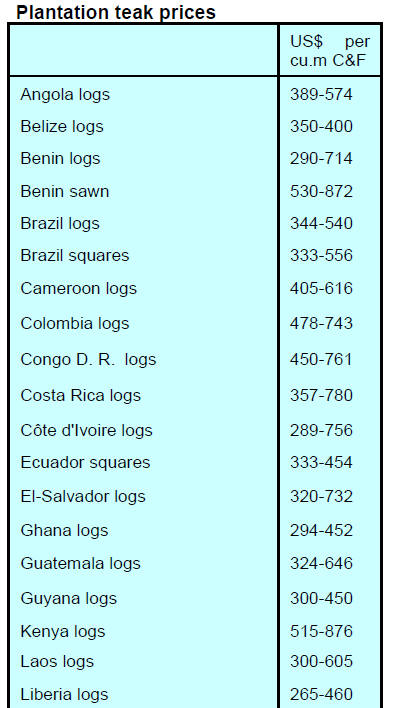
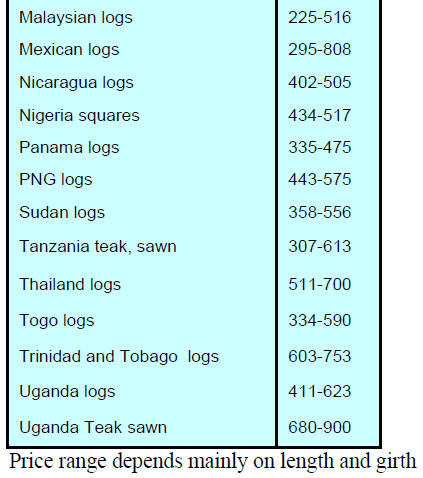
Locally sawn hardwood prices
Prices for locally sawn hardwoods remain unchanged.
Analysts write that, while importers are looking for better
domestic wholesale prices as log FOB prices climb the
level of competition in the local market is too strong for
this to be achieved.

Imported sawn Myanmar teak
Prices for imported Myanmar teak remain unchanged.
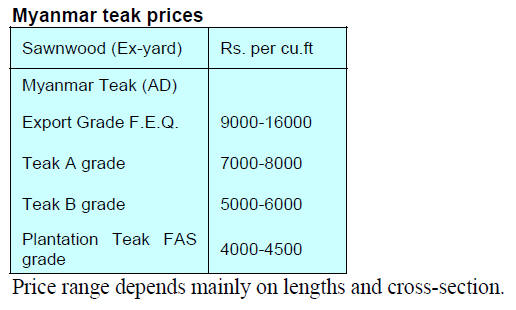
Prices for imported sawnwood
Prices for imported sawnwood (KD 12%) remain
unchanged.
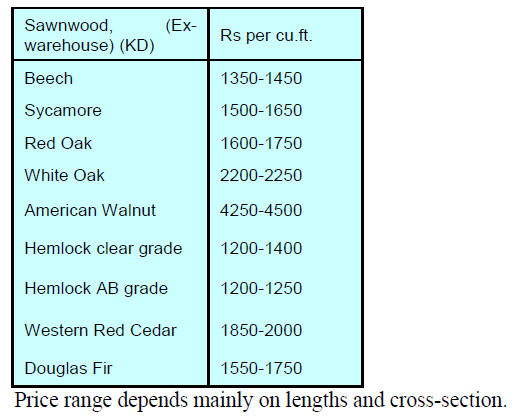
Plywood
Plywood manufacturers are facing growing competition
from wood/plastic composite boards as many new mills
are being established. The marketing of WPC panels
emphasies the waterproof and insect resistance properties
of these panels.
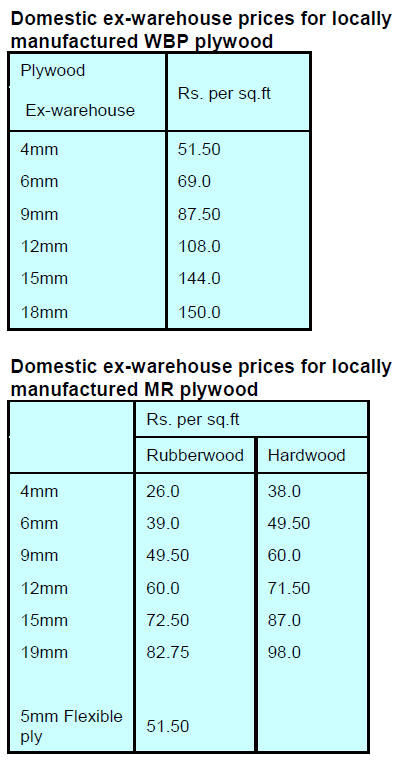
7. BRAZIL
Community forests can deliver
more timber
BVRio and Imaflora (Forestry and Agricultural
Management and Certification Institute) have published a
study "Commercialisation of wood products from
community forest management: diagnosis, options and
recommendations for the sector".
This study presents a survey of the current situation of
community forest management (CFM) in Brazil to identify
barriers and opportunities for improving growth in the
sector.
The report suggests CFM in Brazil has the potential to be
applied over 46 million hectares in the Amazon. The
national and state forests of the Amazon which total more
than 28 million hectares could, through sustainable
management, generate forest products worth between R$
1.2-R$ 2.2 billion per year the report says.
However, the current contribution of CFM to timber
production said to be well below its potential and there are
many hurdles to overcome to release the full potential says
the report.
See: http://www.bvrio.org/wpcontent/
uploads/2018/03/BVRio_Imaflora_Manejo-
Florestal_WEB_Low.pdf
Proposals to eliminate unnecessary timber seizures
A national forum on forest-based activities presented a
proposal to amend the Normative Instruction 21/2014 and
CONAMA Resolution 411/2009 and 474/2016, which
deals with the identification of forest products for the
purpose of inspection.
The aim of the new proposal is secure adoption by
inspection agencies of identification by species and
conversion rates in cubic metres. This proposal was
backed by the State administrations in Mato Grosso, Pará,
Rondônia, Acre, the major suppliers of forest products.
The current inspection procedure is a problem say
analysts. For example, fresh cut sawnwood measuring
40mm thick will be measured for volume but as the timber
dries there is shrinkage and the timber could become
38mm thick.
If the timber shipment is re-measured at 38mm thickness
the volume will differ from that of the volume for fresh cut
timber and this can be deemed mis-reporting and can lead
to seizure. The new proposal aims to provide suggestions
on shrinkage allowances to improve inspection processes
and avoid unnecessary seizures.
The proposal was well received by the environmental
agencies which control the origin, transportation and
commercialisation of forest products and analysts
anticipate a change to the system will be adopted in May
this year.
February export round-up
In February 2018, Brazilian exports of wood-based
products (except pulp and paper) increased 27% in value
compared to February 2017, from US$192.3 million to
US$244.0 million.
Over the same period the value of pine sawnwood exports
increased almost 26% from US$30.8 millionto US$38.7
million. In terms of volume exports increased 21% over
the same period from 152,700 cu.m to 185,600 cu.m.
On the other hand tropical sawnwood exports declined
slightly from 31,100 cu.m in February 2017 to 31,200
cu.m in February 2018 however, export values rose around
4% o US$ 14.3 million.
In February pine plywood exports increased sharply (56%)
in value in comparison with the figure of US$36.7 million
February 2017, from. The increase in the volumes of pine
plywood were more modest at 27%,from 138,100 cu.m to
175,200 cu.m.
As for tropical plywood, export volumes and value
increased from 9,800 cu.m (US$3.6 million) in February
2017 to 12,700 cu.m (US$5.2 million) in February 2018.
In addition, exports of wooden furniture also rose from
US$32.8 million in February 2017 to US$38.7 million in
February 2018, an 18% increase.
Monthly data released by the Ministry of Development,
Industry and Foreign Trade (MDIC) for February show a
significant increasing pace of all types of furniture exports.
Compared to February 2017 furniture export increased by
17% to US$51.6 million compared to US$44.1 million.
The positive result is mainly due to the expansion of sales
to the United States, which rose 27% in the first two
months of this year and to the United Kingdom (up 24%).
The top three importers (US, UK and Argentina) increased
their share of the total volume from 47% in the first two
months of 2017 to 49% this year.
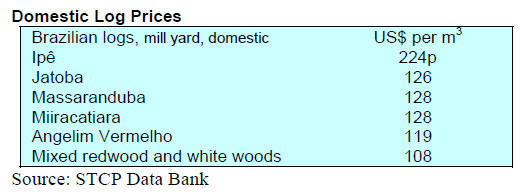
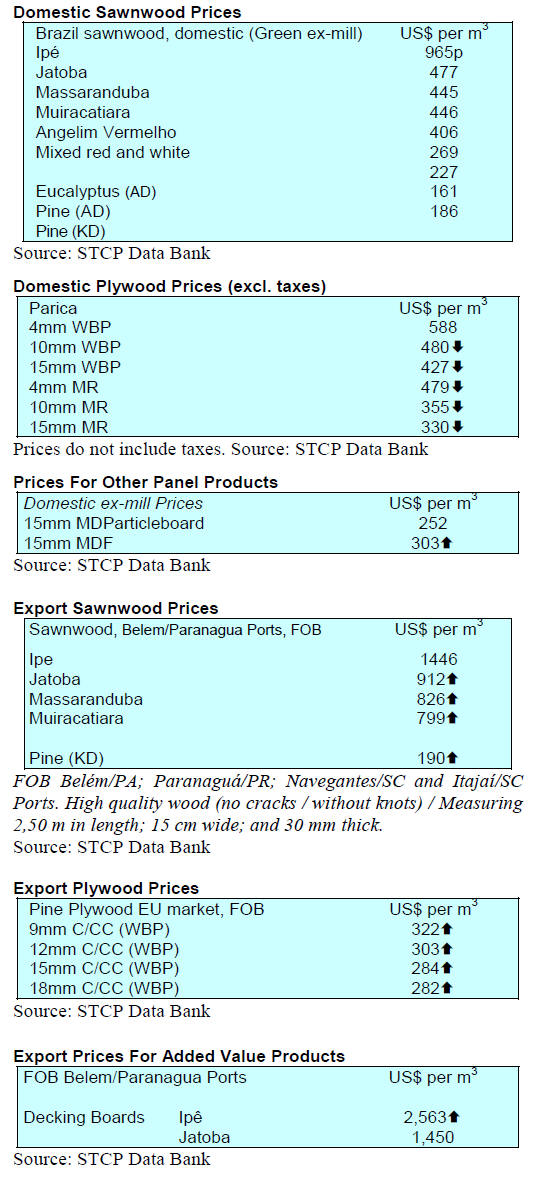
8. PERU
Timber industry: barriers and
opportunities in internal
trade
The Technological Institute of Production (ITP) -
CITEmadera in cooperation with FAO has released a
report "The Timber Industry in Peru: Identification of
Barriers and Opportunities for the Internal Trade of
Responsible Wood Products", This warns that the timber
sector is characterised by a high level of business
informality.
See:
https://gestion.pe/economia/industria-maderera-barrerasoportunidades-
comercio-interno-229820
The report concludes that the domestic market absorbed
some 90% of all out put in 2015 up from just over 60% in
2007.
Analysis of domestic demand looking at domestic supply
and imports found that, on the basis of volume, the main
products and distribution were as follows sawnwood
(14.3% imported), agglomerated panels (78.3% imported),
industrial round wood (13.8% imported), sheets and
plywood (26.0% imported), wood charcoal (0.5%
imported) and sleepers (27.5% imported). Domestic
production did not satisfy demand in the domestic market
in 2015.
The report concludes that the main barrier to trade in wood
from sustainable and legal sources is the high rate of
‘informality’ in the sector. To address this it is necessary
to strengthen of business management, improve company
control procedures, strengthen concepts of quality and
sustainability and create a culture responsible business.
Tecno-mueble 2018 Fair
The aim of the Tecno-mueble 2018 Fair, a domestic event,
was to provide an opportunity for furniture manufacturers
in the country that could not afford to attend international
fairs to experience the latest technologies.
The Fair was opened as part of the Day of the Carpenter
celebrations in the Industrial Park of Villa El Salvador,
Lima and showcased, machinery and industrial equipment
for wood working.
This eighth Fair attracted more than 4,000 furniture
entrepreneurs from the interior of the country such as
Loreto, Ucayali, Pasco, Madre de Dios, Tacna, Cajamarca,
Piura, Ica, Moquegua, Ayacucho, Arequipa.
APEC adopts new suggestions on combatting illegal
logging
A proposal from Peru on approaches to combating illegal
logging was incorporated into the 13th meeting of the
APEC Expert Group on Illegal Logging and its Associated
Trade (EGILAT) which took place in Port Moresby, Papua
New Guinea.
The Executive Director (e) of the National Forestry and
Wildlife Service (SERFOR), John Leigh Vetter, who was
at the meeting reported that APEC member countries
agreed to organise a workshop in 2019 in Chile, the
purpose of which would be increasing knowledge of the
tools and methods available to prevent and combat illegal
logging.
In a presentation, the Executive Director of SERFOR
made known the ongoing activities in sustainable
management and the building cooperation between
institutions and authorities to prevent and confront illegal
logging.
Peru major buyer of Ecuador’s particleboard
Ecuador’s exports of particleboard amounted to US$97.3
million in 2017, an increase of 8.5% compared to 2016.
Colombia and Peru were once again the main export
markets for Ecuador’s particleboard. Exports to these two
markets accounted for 94% of total exports in 2017.
Exports to Colombia amounted to US$57.3 million (2016:
US$50.9 million) a significant rise of around 12%.
Exports to Peru amounted to US$34.1 million, a 4.6% rise
compared to US$ 32.6 million in 2016. Exports to
Panama, the third most important market, recorded a slight
drop US$2.71 million in 2016 to US$2.66 million in 2017.
Bolivia, the fourth largest market, posted a sharp drop
(-18%) to US$1.31 in 2017.
